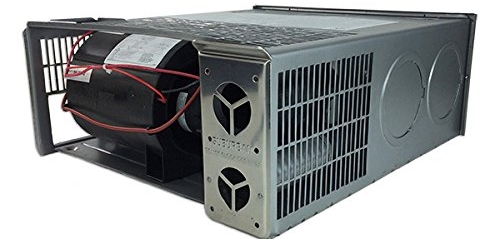RV Furnaces
RV Furnaces of today are really quite sophisticated! They are also very safe. An old timer will easily remember the skill it took to light some of the early day furnaces, many times with your face turned away in fear, too!!
There are actually 4 different types of ways to be heating your RV. Some are part of the same system, while others are only 1 of them.
Going from the top (literally) down:
1. A "heat strip" that will provide minimal heat through your rooftop ac system.
2. A heat pump/exchanger as part of the rooftop AC system.
3. Conventional Propane heated forced air heater.
4. Aqua-hot boiler type system providing moist hot air.
Heat Strip Heater System
Heat strips are small electric coils that are placed in front of the fan blower of the rooftop ac unit. The electric heat strip will heat up and hence blow warm air out the roof top ac ducts or direct vent of the AC unit. It isn't really designed to keep you toasty warm, just take a chill out of the air. Don't forget, heat rises and these start in the ceiling - not a lot of "heat" will get to the floor!

Above - What a typical heat strip looks like - positioned in front of your ac fan blower.
Heat Pump/Exchanger
RV Air Conditioning can also be the home style heat pump or exchanger. It is a reverse of what your rooftop ac unit does. Normally it takes the hot air out of your RV, this system simply reverses that (very simple explanation!)
In most cases, these type of rooftop AC units will be high output for the AC and provide some pretty good heat too! Course, if you are hooked up to shore power and not on an electric meter - it's really good! No propane is needed/used.
Some will work only in a direct vent to the RV, rather than through a ceiling duct system. Good to know if it's available on the RV you are looking at purchasing!
Propane Heated Hot Forced Air Heater
This is the most common type of RV Furnaces in almost all types of RV's. The propane furnace works well, economical to install in the RV in manufacturing and propane is a common source of fuel.
These are very similar to the stick and brick type forced hot air furnaces - except they run on propane, not natural gas. They require some maintenance, as everything does - but a little more unique.
First of all, bugs love the smell of burning propane! They will try to build nests in the vents from the outside - they must be screen protected with a "Mud Dauber/Flying Insects Screen" and the vents should be cleaned annually.
The inside air inlet from the RV to the furnace needs to be cleaned - especially if cats, dogs, etc., live with you!
As we have all experienced - forced hot air RV furnaces are noisy and very dry! They are ideal in a moist climate, but can really hurt your sinuses in an already dry climate area. The old wives tale of putting some cups/pans of water out to add moisture sure will help your nose!
In many RV's the duct work for these heaters is not below in the storage area - a definite negative in a cold climate environment!It will usually be added to the floor/sidewall area of the RV, providing good floor heat - but nothing down below to assist keeping your water tanks from freezing!
A great advantage to these RV furnaces is that they can be be very compact and be well hidden within your RV. Many are located under the refrigerator - completely out of view! They will have 2 small vents outside as well.
Above - typical image of a RV hot air furnace - propane fired.
Must Have - Screens over the outside Propane Furnace Heat Exchange Tubes

Aqua-hot Hot Water Heat
RV Furnaces wouldn't be complete without "featuring" the best - Aqua-hot Furnace Systems.
They are by far the most complex and difficult to get repaired - but their design is awesome. It provides heated water throughout the RV for registers to then heat the inside for the occupants. If the engine (diesel only) is running, it will use the hot water generated from that engine while driving to heat the water throughout the RV. If parked, a diesel powered "boiler" (or propane if a gas engine RV) will heat the water and send it throughout the RV, providing perfect moist heat. It can also be setup in "zones" to be even more effective for the occupants!
The system will unfortunately require a complete storage section as well as running water piping throughout the "basement" storage areas.

Picture above of the Aqua-Hot Boiler System.
As you've seen, RV furnaces come in all shapes and styles -
it's just a matter of you deciding what you like best!
